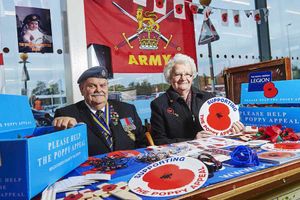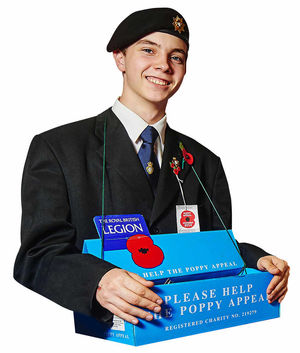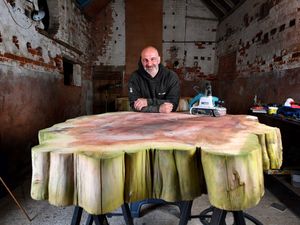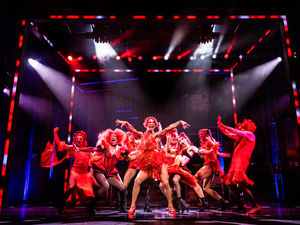Real life: There's no glory in war, it's miserable
The Royal British Legion works tirelessly to help British servicemen. We meet one man who has been helping them support their cause.

Every Saturday we dedicate two pages in the paper to an iconic figure – a celebrity or person of note that has inspired, amused or captivated us and the world.
This week however, we're turning our focus to an organisation that has been inspiring, aiding and supporting British servicemen and women for 95 years.
The Royal British Legion's main purpose was straightforward when it was established in 1921. They worked to care for those who had suffered as a result of service in the armed forces of the Great War. This counted for both those involved directly in the conflict, but also for families that had been affected back at home too.

1915: Opening lines of war poem In Flanders Fields – written by Canadian army doctor John McCrae – refer to poppies flowering over graves of fallen soldiers on churned-up battlefields of Western Europe.
1918: Moved by McCrae's poem, US teacher Moina Michael begins campaign to sell handmade poppies as way of raising funds for wounded ex-servicemen.
1919: Armistice Day first observed throughout Britain and Commonwealth, with two-minute silence to mark moment when war ended in 1918 – at eleventh hour of eleventh day of eleventh month.
1920: American Legion becomes first organisation to recognise poppy as symbol of remembrance.
1921: Inspired by Moina Michael, Frenchwoman Anna Guerin brings poppy selling to Britain, where Royal British Legion begins Poppy Appeal tradition.
1922: British Army major George Howson opens first poppy-making factory staffed by disabled soldiers. Factory still makes millions of poppies today.
1945: After end of World War II, Armistice Day becomes known as Remembrance Day to include all those killed in both world wars and other conflicts.
To this day, the charity works tirelessly to raise money to help – most notably with their annual Poppy Appeal. We spoke with the Chairman of the Great Wyrley branch, John Talbot, at their local Sainsbury's store where he and his wife Brenda have been selling poppies for over a decade.
"When I joined the legion there weren't many members or people joining up. We were a sub branch of Cheslyn Hay but came to Wyrley about 12 years ago. Since then we've become a branch in our own right with nearly 100 members."
The 76-year-old couple have been married for 55 years and since their retirement have dedicated their lives to the charity.
In their first year of collecting at the store, John, Brenda and the local Royal British Legion raised £2,000. Last year, this figure rose to a huge £13,000.
John puts this down to the support of the store where they sell the poppies and give a huge credit to the youngsters that have joined the Royal British Legion over the past few years.
He said: "Sainsbury's have always looked after us and on November 11 I will come back to the store and lead the two minutes' silence. Our idea of selling poppies is to be cheerful, so we have a laugh and a joke.
"I must be doing something right because people know who I am now and ask after me if I'm not there! We have a strong emphasis on youth and the air cadets and navy sea cadets are affiliated with us now and collect with us.
"I go round to schools and talk to young people who weren't aware of what we do. Now younger people make up around half of our members.
"The cadets do a great job with us. It's a case of letting them see that they're welcome and wanted. Sometimes there's a barrier there because they feel they're intruding, but it's important that they're welcomed and not talked down to. It's the same when I go in to see the school kids, I talk to them on their level."
And engaging with the younger generations is, in John's opinion, of optimum importance.
He added: "It's most important that we keep teaching children about the First World War. Children these days don't realise today that there's not a family here today that haven't been in some way affected by it at some point down the line. I lost an uncle myself – they never found him."
John first learned about the Great War from his own grandfather, who spoke about the conflict very little like many men of his generation. The memory of what he did say stayed with John for his entire life, inspiring him to keep the memory of those affected alive.
He said: "My grandad told me about the war only once. He said it was miserable. It was filthy. There were rotting bodies, flies, no sanitation and they were up to their ankles in the trenches. There were rats eating bits of bodies and they had grown as big as dogs.
"He told me: 'there is no glory in war, that's what war is, and that's all I'll ever say about it'. He never spoke about it to me again.
"That really got me thinking and so I started reading up on it. There have been eighty wars up to date and there's only been one year that British forces haven't been involved."
Like all men of his age, John completed national service as a late teenager, passing for the RAF at just 18.
"As an ex-RAF supplier, the good work carried out by The Royal British Legion for veterans, families and young people coming back from war is incredibly close to my heart. I was called up for my national service when I was 18 and passed for the RAF.
"I completed my service at 22 and started working in the electrical industry. Since I retired I dedicate all the time I can to working for the Royal British Legion."
When the First World War came to an end, Britain's economy plummeted, leaving two million people unemployed. Over six million men served in the war and 725,000 of those never returned. Among those that did come back were 1.75 million men that had suffered a disability, half of which permanently so.
Lance Bombadier Tom Lister, a Lancastrian, felt that if the government was unable or unwilling to do anything to improve the lives of ex-servicemen and their families then he'd have to do so himself.
John said: "Tom Lister was appalled and angry. The government wouldn't help, so in 1919 he set up the Great British Legion. That man is my hero. What that man started spread across the country and so in 1921 and ever since we've helped all servicemen and all people regardless of which war they were affected by. From casualties from the Falklands to those involved in conflict now.
"We are not a war mongering association. We abhor war as we know the after effect of it. We look on our legion as the real armed forces charity."
As well as collecting money for the Poppy Appeal, John also worked to have a new memorial erected in the Great Wyrley Memorial Gardens, to commemorate not only the lives lost in the First and Second World Wars, but in all conflicts since.
He explains: "In 2004 I stood in the remembrance gardens in Wyrley and read out a tribute to the fallen. I stood looking at the memorial gates that mentions the Great War and the Second World War but what happened to those involved in wars in Borneo or the Middle East? People seem to forget about them. The gates are proud and we lay wreaths there, but where is our generation?
"After that moment, I designed an obelisk memorial which was then erected in the memorial gardens. There are no names on it because we stand for all casualties. Not just personnel but the innocent too. War is a madness that man doesn't seem able to stop. The obelisk has no names on it because it serves as a memorial to victims of war from the past, those in the present and – God forgive us – the future. It will be as up to date in 100 years as it is now.
"On Remembrance Sunday we have a service there and now we lay wreaths at the obelisk as well as at the gates. They stand in beautiful surroundings, with trees and plants all around."
And the Royal British Legion is, in John's words, a growing and thriving organisation to be nurtured, the keep the memories of those lives lost in people's minds.
"I see the Legion as a big tall sturdy oak tree. We can prune the top but if you mess with the roots, it will die.That's how I see the branches of the Legion – the roots that make it grow. I work with a wonderful bunch and I think I've got the best job as the Chairman of our branch."
For John, the Legion can only continue if young people truly understand the purpose of the organisation, which is why he dedicates his time going in to schools to teach children about it.
He said: "I tell the youngsters that they're the men and women of tomorrow. We're the men and women of yesterday and today but it's for them to now carry it on.
"When you ask 'why the poppy' it's a hard question to answer in short. When I go into schools and kids ask me about the importance of wearing it, I tell them a bit of history.
"Back then, the battlefield was a dirty landscape, with sludge, shells, bits of bodies and all sorts. The green and fertile land had been bombed and gassed and the soil had been poisoned by cordite. Nothing would grow there.
"Then one day, the soldiers somehow saw a tinge of green. Gradually it grew into beautiful poppies.
In this terrible hell, the poppy gave a hope. It was a symbol of the future in no man's land, showing that life carries on.
"So they picked them and wore them in their hat bands. After the war it was a terrible situation for those returning. There was no welfare state, nothing.
"It's important that we always remember and honour the past. We as the Legion still look after those who serve this country in war 95 years after we were founded and I'm very proud to be a part of that.
"I believe in it wholeheartedly. We look after the dead, the injured and their families and children. Our help is always there, there's no time limit and it doesn't matter what conflict they were involved in.
"We are still looking after them today and will never, ever stop. Twenty four hours a day, we're always there. Anyone who has been in Her Majesty's Service that requires our help, they will always have it."
By Kirsty Bosley





